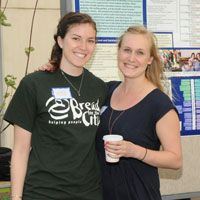
Gloria Wilder, M.D., M.P.H., president and CEO of Core Health, arrived more than an hour late to the Interdisciplinary Student Community-Oriented Prevention Enhancement Service’s (ISCOPES) end-of-year celebration at the George Washington University, April 17. Despite leaving her home near Manassas, VA, at 5:30 AM, she couldn’t defeat the traffic.
But Wilder, who was the event’s keynote speaker, was worth the wait. “I love talking to students who want to make a difference in the world,” she said.
Wilder was talking to the right crowd. ISCOPES participants are all volunteer students from GW’s School of Medicine and Health Sciences, School of Public Health and Health Services, and School of Nursing, as well as from George Mason University’s School of Nursing, who partner with community-based organizations to do just that.
This year, the 17 multi-disciplinary groups developed an implemented a variety of health-promoting projects in some of Washington, D.C.’s most underserved communities. They organized an annual “turkey trot,” created health services resource guides, led yoga classes, taught high school students about HIV prevention, educated practitioners about immigrant patient rights, and more.
During the celebration, which was themed “We’re All in This Together,” the teams put their work on display, sharing points of pride and lessons learned with one another.
“It hasn’t always been easy,” said Angie Hinzey, M.P.H., director of ISCOPES, who delivered welcoming remarks, “but some of you had the chance to transcend — to stop thinking about your individual needs and start thinking about the needs of others.”
During her keynote address, Wilder echoed this sentiment, telling students to continue service to the community throughout their careers. She told them that, as clinicians, they have a great responsibility and privilege to be leaders. “In medicine, leadership is not something you can force yourself into,” she said. “It’s something you realize is on your plate whether you like it or not. You realize people are following you, they’re listening to you, they’re taking your advice.”
Wilder stressed the importance of fighting against health care disparities, or what she calls economic segregation. She said that these disparities are alive and well and are affecting the students’ neighbors, fellow bus riders, and the people they pass every day on the street.
“Economic segregation in health care is real — and the void is in leadership,” she said. “Not the kind of leaders with fancy titles and nice salaries, but the kind of leaders who want to get out on the street level and help people.”
As the founder of Core Health, LLC, a company that promotes community wellness and economic development in local underserved populations, Wilder has significant experience interacting with and helping people “on the street level.” The people who’ve made the biggest impact on her life, she said, are the residents of D.C. “The life you change is ultimately going to be your own.”
But when you want to change the world, where do you begin? “You start by starting,” said Wilder. “You have an idea and you give it a shot. If you have a nugget, a kernel of an idea, water it.” As her experience demonstrated, every grand plan begins with a small idea.
In the meantime, Wilder told the students, don’t get discouraged by people who don’t believe in you. “Don’t worry about living up to ‘their’ standards,” she said. “Measure up to your standards, graduate, and then do something about it.”


